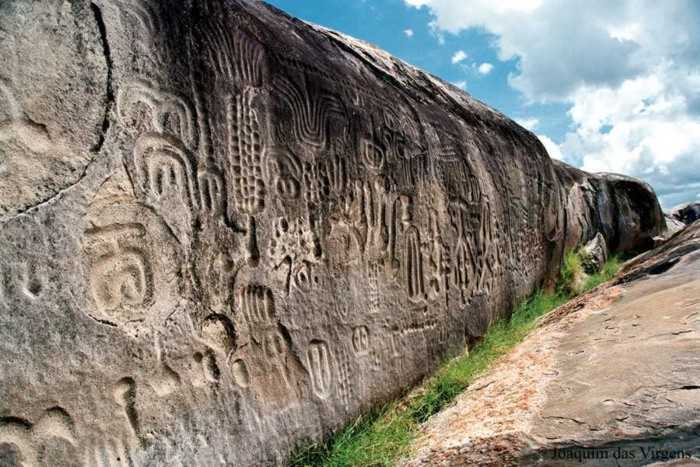Kristen Callihan
Baraldi, Gabriele d’Annunzio
 Gabriele d’Annunzio Baraldi (1938-2002) was Italian by birth but moved to Brazil’s São Paulo until his death. He did much to publicise the incredible range of artifacts left by the many ancient civilisations that existed in Brazil. Among those remains is the remarkable Ingá Stone, which is covered with petroglyphs for its entire 24-metre length. Baraldi claims that the locality was a Hittite colony and that a Hittite empire had existed in Brazil(c). Huari Roman links the Ingá Stone with Atlantean refugees from sunken Atlantis in the Atlantic. He also associates Ingá with Inca! [1127.222]
Gabriele d’Annunzio Baraldi (1938-2002) was Italian by birth but moved to Brazil’s São Paulo until his death. He did much to publicise the incredible range of artifacts left by the many ancient civilisations that existed in Brazil. Among those remains is the remarkable Ingá Stone, which is covered with petroglyphs for its entire 24-metre length. Baraldi claims that the locality was a Hittite colony and that a Hittite empire had existed in Brazil(c). Huari Roman links the Ingá Stone with Atlantean refugees from sunken Atlantis in the Atlantic. He also associates Ingá with Inca! [1127.222]
In 1983 Baraldi gave a newspaper interview in which he claimed that there was evidence for Atlantis to be found “Under the rocks of the National Park of Seven Cities, which is 26 miles from Piripiri Piauí” in northeast Brazil(a)(b).
>In August 2023, Kristen Callihan published an article about the Ingá Stone on the Ancient Origins website outlining the theories currently offered to explain its purpose and origin. It notes that Baraldi identified 497 symbols on the Stone and the surrounding area. An 18th-century proposal that the symbols were similar to early Phoenician carvings came from Fr. Ignatius Rolim. Similarly, Ludwig Schwennhagen also perceived similarities with the Phoenician as well as ancient Egyptian demotic writing. The lunatic fringe has not missed an opportunity to suggest a possible extraterrestrial involvement(f).<
There is now a website dedicated to Baraldi’s work(d), as well as an e-book, in Italian, Un archeologo sulle tracce di Atlantide, which can be downloaded.(e)
(c) https://brazilweirdnews.blogspot.ie/2012/09/the-miystery-of-ingas-stone.html
(d) https://web.archive.org/web/20200322232943/http://www.gabrielebaraldi.arq.br/
(e) https://www.scribd.com/document/29677685/eBook-G-D-Baraldi-Un-archeologo-sulle-tracce-di-Atlantide
(f) https://www.ancient-origins.net/artifacts-ancient-writings/inga-stone-006442 *

